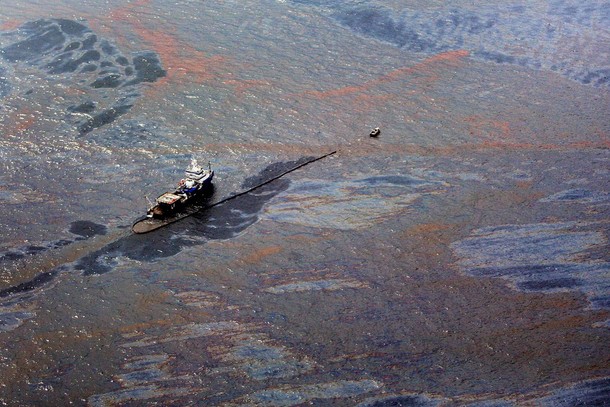
President Obama’s top energy advisor has already termed the oil spill in the Gulf of Mexico the worst environmental disaster in American history, and it’s far from over. The inability to stop the gushing flow has created plenty of vitriol and condemnation in the US toward the federal government and rig operator BP.
But a significant amount of concern and anger is also brewing in the UK, resulting from critical public comments and attacks in the media against BP, one Britain’s largest and most influential companies.
BP’s share price has plummeted more than 40% since the spill began in April and hit a 13-year low on June 10. Some business analysts project the disaster could lead to the company being bought out or even going bankrupt. Such a scenario would strike a major blow to the British economy, especially as BP is a major component in many citizens’ pension funds. Not surprisingly this has caused skittishness among large-scale investors and the populace alike in the UK.
London Mayor Boris Johnson has expressed concern with “anti-British rhetoric” and “name-calling” by American politicians. This reaction likely stems from comments such as President Barack Obama’s remark that he would have fired BP CEO Tony Hayward if Hayward worked for him. Obama’s now-infamous comment that he is looking for “whose ass to kick” in connection with the crisis, and his practice of continually referring to the company as “British Petroleum” even though BP is an international company that officially changed its name in 1998, have also set off British sensibilities. There is a sense in the UK that Obama and the US have unfairly picked BP as scapegoat for the crisis. A recent headline in Britain’s Daily Telegraph newspaper declared “Obama’s boot on the throat of British pensioners.”
A Justice Department statement earlier this week threatening to take action to force to BP to cancel its next dividend distribution caused a stir as well; Hayward has vowed to go ahead with the payout. Chancellor of the Exchequer George Osborne noted it is important to keep in mind “the economic value BP brings to people in Britain and America.” Prime Minister David Cameron reiterated this sentiment by drawing attention to the economic value BP holds for both countries.
BP, the world’s third-largest oil company, is well-known for its reliability in the market and generous dividend policy, both critical to the UK economy and not just for wealthy investors. The company paid the British government $1.4 billion in taxes in 2009, and its dividend payments comprised 13% of the total amount of dividends paid out by all British companies last year. Looked at a different way, BP dividends accounted for £1 out of every £7 the UK’s top 100 firms put into pension funds and savings plans.
BP interests in the US are extensive as well. It absorbed Amoco (formerly Standard Oil of Indiana) in 1998, and 40% of BP shares are owned by Americans. It owns a large refinery in Texas City, Texas, has a 50% interest in the Trans Alaska Pipeline, and holds an enormous gasoline marketing operation. BP is traded on both New York and London stock exchanges and has British and American citizens on its board of directors.
Beyond the economic impacts many in the UK have taken American criticism of BP as a personal affront, reinforcing suspicions of the US as having a narrow-minded, overly nationalistic outlook. A Conservative politician in Britain characterized US behavior with respect to BP as a “crude, bigoted, xenophobic display of partisan, political, presidential petulance against a multinational company.”
For his part, Cameron has largely avoided speaking out against the US—for which he has been criticized by Britons—taking care not to offend one of his country’s closest political, security, cultural, and economic allies. Cameron admitted he understands the US frustration with the disaster and plans to discuss the matter further with Obama this weekend.
Will the oil spill crisis, and the verbal attacks flying back and forth across the Atlantic it caused, bring on a breakdown in the relationship between two historically close partners? Michael Cox, a Chatham House associate, claims the Obama administration is not “quite so enthusiastic about the fabled ‘special relationship’ with Britain because of the emergence of new geopolitical realities in the world, such as the emergence of India and China.”
However, Cox notes the US and the UK still have many important ties, primary among them security forces stationed in Afghanistan. In addition the largest foreign direct investor in the US, which has an economy increasingly dependent on foreign investment, is the UK.
While the aftermath of the oil spill is not likely to threaten the US-UK relationship in the long-term, it has certainly drawn out some cultural and behavioral differences between the two allies. Perhaps the best thing both countries can do now is put aside the assessment of blame and work together on developing a viable solution for the spill and a comprehensive plan to prevent future disasters.
Scott Bleiweis is an intern with The Atlantic Council editorial office. He is currently pursuing a masters degree in International Studies with the Korbel School of International Studies at the University of Denver. Photo credit: Reuters Pictures.
Image: 610x_16.jpg
